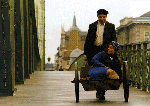
Károly Eperjes and
Kriszta Szalay
65 KByte
The newest film entitled 6:3 by Péter Tímár was first presented at the 30th Hungarian Film Week in February 1999. This interview was recorded in December 1998 when the director had just finished film editing and started mixing sound so Ms Bathory only saw the film in a half-finished state.
6:3
The football match of the century started
at 3.15 PM on November 25, 1953. The country had been waiting for
that moment for months. People gathered around the radios which
could be found even places where it had not been customary
before. It was the Golden Team on the field against the English
team that had been undefeated up to that point.
Bakáts Square. Just before the first kick a man appears from
nowhere, no one knows him but he manages to ruin everyone's
pleasure since he tells the goals in advance. Each tip of his is
for sure ("tutti" in slang) and he also calls himself
Tutti. A woman named Helén who has just returned from
deportation and now works as a street sweeper thinks it is
necessary to take care of this strange gentleman. During the 90
minutes of the match reported live by György Szepesi, Helén and
Tutti keep rushing from place to place to catch the broadcast:
from a bar to a barbershop; from a butcher's shop to the
Gellért-spa; from the apartment of a Kossuth-prize winner writer
to an espresso… Since the State Security Authorities have also
started looking for the lad they have to flee. While Tutti,
Helén and her ex-boyfriend keep hiding from the police the match
of the century keeps running. But who knows the scores? And what
happens to him? And what's going to happen to us? Perhaps he
knows more than only the scores?!
The length of the movie is same as the broadcast's: 90 minutes.
One and a half-hour were enough to the victory that has remained
the biggest national triumph for us since. But was this 90
minutes enough for our hero to rewrite his private story? Because
that is the main question of this movie.
6:3
written, edited and directed by: Péter
Tímár
edited by: Andrea Vészits
photographed by: Péter Szatmári
set director: András Gyürky
costum by: Zsuzsa Pártényi
music by: Tamás Cseh
producer: Gábor Kálomista (Megafilm)
cast: Károly Eperjes Kriszta Szalay, Tamás Cseh, László
Gálffi, Tamás Végvári, Tamás Fodor, Attila Lőte, András
Kern, Miklós Székely B., József Szarvas, Gábor Reviczky, Ági
Bánfalvy
This script lied in your drawer for years just like Feri's gang or did you write it right after your last movie?
I started to write it in March this year, but the idea itself came to me years ago when I was directing the Here Goes the Railway-line at the Chamber Theatre of Józsefváros. I was told that I should write something for the company - a comedy dealing with a theme of today. I imagined how effective it could be, presenting a story with interior scenes on a revolving stage, around the time of the famous Hungary - England football match, about a man who goes places to places where people listen to the broadcast and keeps getting in trouble. In addition I had that remarkable experience to hear the original broadcast with György Szepesi and to saw the film The Golden Team by András Surányi in which the voice of Szepesi was recorded and mixed afterwards. The difference was astonishing although the text itself was the same word by word. The original was full of tension and a kind of demonic power. That was supposed to be the base of a film novel, which has never been born since I cannot write neither film novels nor treatments. For me even synopsis is a dead genre, I can only write screenplays. The figures start talking in my heads and I put it down on paper. How should I know what's going to happen when it is happening right at this moment when I am writing it?
Why did you call that broadcast demonic?
During the broadcast Szepesi says many times that this is the match of the century. Do you copy?! In 1953, in the first half of the century he declares that this is the match of the century. And he was right! Isn't it mystical?
By the way: did you analyse that period? Why was that match so cathartic?
I do not know exactly. It was not only the victory alone since the Hungarian team had been winning all the matches for three years. Maybe it was due to the fact that they defeated the English team on home ground where no other team had been able to win so that was the biggest victory of all. But the best explanation: in the 50s the football was the only common joy that was able to give positive self esteem to the people, the only experience the people could identify with, about which they could express strong emotions and feelings. For example they could sing the national anthem out loud in public with no fear! Among all the Hungarian matches that one was the top, the best, the miracle…
But in 6:3 you not only recall the events of that certain day in 1953 in order to tell us a story from the past: what we see is a fantastic time-journey and we are in the middle of the events of November 25, 1953… And your goal is not to recall the exact events or to make the main figure intervene in the known events in the past…
The movie starts with a motto by Dezső Tandori: " At the end the past always turns out to be as it could have been, as one would have liked it…" There are only three things that our hero has tried to fix in his whole life: to find out who his mother was; what happened on the day of his birth - that happened to be the day of the 6:3 match, too -; and to know the winning toto (a certain form of lottery) combination just once…But instead of all this what he does is much more important: he gets a mother. He finds a family. We know that he grew up in an institution, he had no mother, and he was called 6:3 because he was born on that day of the victory… But he also holds a mirror to the past: everything that happens in Budapest and the whole country during the broadcast shows how ridiculous the system was back then. In the chamber of the State Security Authorities the prisoner and his examiners listen to the radio together and they embrace obliviously at the goal. Because beyond the self-esteem there is the national pride, the identification with the national glory. We can say that 1956 started at that moment of solidarity and unity that nothing compares to. That outstanding and unique moment, that 90 minutes was possible to remember. It was worth to remember. No other big common experience can be recalled in the 50s up to 1956…
Maybe the liberation was such an uplifting common experience, wasn't? Just like in France or with the Englishmen…
Yes but in our country it got dirty right away. Well, I was condemned in Élet és Irodalom (Hungarian weekly publication on literature and public life) because of my opinion that the match, the broadcast was the first step in forming that big national unity of 1956. But some football fans alone did not create that big national euphoria of 6:3! Then and there, in that euphoric 90 minutes the whole society had a chance to an unbelievably big thing…By the way: our hero is chased and pursued and thrown into water because he keeps talking during the match and this way he steals the only pleasure of people. He takes away the match from them! Their match!
Let's talk about the writers! The whole group is ridiculous and pitiful but scary at the same time because while - as they say - they do forbidden things they seem to be very self-assured and well-informed. There is only one among them we are able to identify with a real person, the one who say one row from his later famous poem about tyranny…
To create these figures I got help from a book entitled The writers and the ruling power published two years ago. I was astonished while reading it how much effort these people made to fit in, to get close to the ruling power. But there is the writer figure played by Tamás Cseh, who makes a living as bar pianist. He is the only free man among the writers. Independent and bohemian. He can think whatever wants.
There are many self-biographic elements in your movie…
Well, it is true but for the audience it bears no importance. But of course it is no accident that most of the scenes happen on Bakáts Square. I was born there, I grew up there, and everything in the movie looks like as it was in my childhood. Even the maternity ward is still there but the portal has been rebuild so much that we should have paid a lot to reconstruct it. Instead we used the school building as hospital. There was a strange moment during the filming: some children, extras, was running up and down on the square and suddenly I felt I saw myself among them.
The movie ends with a scene in which the three of them - the family - are walking down the street through the square chatting in a good mood with Helén pushing the trash cartridge. In other words she is working. What is this "street-sweeperness"?
Helén says it herself: it is a basic service. While they satisfy their own basic human need for working and feeling useful they are out in the nature and feel completely independent inside. This "being outdoors" is a very typical attitude among intellectuals at that time. The walking-tours, the art house in Szigliget, the resorts at Lake Balaton and along the Danube were all some kind of compensation for lack of real freedom.
Would you mind sharing with me how you chose the actors?
It was no question that Károly Eperjes is the one and only for the role of Tutti, I do not even waste time to explain that. He is good, very good. I found Kriszta Szalay in Theatre Thália. She had not played in film before, but the way she moves, the look on her face, her age and her whole appearance made her perfect for being Helén. She is called Helén because there is a song from the 30s "Oh, Helén only Helén" that I wanted to use in the film by any means, so that's why the leading lady is called Helén. I love trying out new, unknown faces and most of the times they turn out to be good, like Kriszta. I have worked with Tamás Cseh, Gábor Máté, Györgyi Kari and László Méhes already. I like and respect Tamás Fodor and I wanted to work with him for a long time. Ferenc Kállai is very good in the role of the owner of the barbershop. In the Gellért-spa scene the actors managed to create the atmosphere of the life of non-communist elite in the 50s and not accidentally in a spa.
This story requires a genre you have never used before. In my opinion this is a wonderful human tale. Full of jokes, we laugh self-forgetting sometimes but at the same time it is sad. Sad, because if one would like to get a mother, a family, solidarity, a nation, an acceptable past, one has to go back to the past to correct it. That's why there is no "Tímár-trick" in the film?
Yes, it would not fit. This is a tale, indeed. It is only happen accidentally in every 30 000 year that one is able to correct their past as they want it. But in this movie one can catch a big effort in making the film: the cinematographer Péter Szatmári and me worked with a static camera all the way. He put the camera down and fixed it and I directed the scene in the frame. I would have never believed that it required such a big concentration. It felt I was directing the my exam-film, and had to prevent the camera from moving, everything must happen within the camera angle because everything happening a little farther cannot be seen. But of course sometimes an actor sat down and "moved out" from the frame.
This staticness plays the same role in presenting the age as the other sign that on November 25, 1953 the sun never shines, everything is grey, even the Bakáts Square?
Yes, this greyness and stiffness: the 50s. But I looked up, on that day it was a gloomy and grey autumn weather. By the way: the external shots were filmed in summer since the actors have more time in summer and sometimes we had to work with scarf and coats on to pretend it was November weather, but the internals were filmed in autumn.
So let's roll? May the critics come?
You bet!
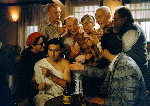
76 KByte
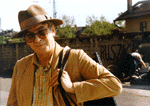
Tamás Cseh
71 KByte
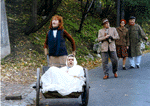
102 KByte
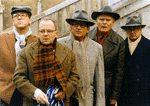
László Gállfi,
Tamás Fodor,
András Kern,
Attila Lőte,
Tamás Végvári
93 KByte

64 KByte
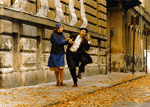
Károly Eperjes and
Kriszta Szalay
112 KByte
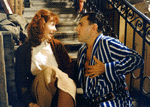
91 KByte

Péter Tímár
80 KByte

